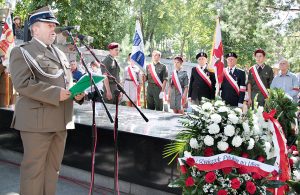- August 18, 2014
- 641
The Polish Armed Forces Day: Inhabitants of Vilnius paid homage to the heroes

“Security and independence should not be taken for granted. We have to fight for them” – said Polish Defence Attaché Colonel Zbigniew Szlęk at the Rasos Cemetery during the celebrations of the Polish Armed Forces Day.
The ceremony by the Mother and the Son’s Heart Mausoleum began on Friday, 15th August, at noon – right after the assembled people have heard the roar of airplanes engines when the Polish fighters which guard the airspace in the NATO Baltic Air Policing mission flew over their heads.
“The Polish Armed Forces Day is connected with the victorious Battle of Warsaw, known also as “Miracle at the Vistula”. The outcome of the battle has, however, nothing to do with supernatural powers. Polish Army commanded by Józef Piłsudski demonstrated military excellence, unmatched determination and heroism while rescuing the country from destruction approaching from the East” – said Colonel Zbigniew Szlęk. He emphasised also that although the Polish Armed Forces Day was proclaimed in 1923, it refers to many praiseworthy deeds of Poles and Polish Army in more than a thousand years of the country’s history.
“The defence of Poland and the Polish identity lies in our hands. Often we defend others who need our help” – said Colonel Szlęk. “The effort of the Polish soldiers in the Second World War is still fresh in our memory. Many of them have not came back from battlefields and covered themselves in eternal glory”. Referring to the recent events in the East Colonel Szlęk reminded the assembled people that freedom is fragile, therefore one must fight for it.
“Today we are independent. However, the recent events in the Ukraine remind us that we should not take security and independence for granted, We have to fight for them” – said Colonel Szlęk.
Polish Senator, member of the Emigration Affairs and Contacts with Poles Abroad Committee Piotr Benedykt Zientarski was also present at the celebrations. He stressed that the ceremony is special and symbolic, because this year is the 25th anniversary of freedom and restoration of the Senate to its traditional power position. “I came here not only to emphasise the bond between Poland and you, Poles living here. I am here also, on behalf of the Marshal of the Polish Senate Bogdan Borusewicz and of the Emigration Affairs and Contacts with Poles Abroad, to lay a symbolic wreath as a homage to the great Pole Józef Piłsudski and to all soldiers who fought for freedom and give their lives for independent Poland. Today we pay homage to all soldiers who are proud of the tradition of the Polish soldiering” – said Senator Zientarski.
Traditionally, a crowd of people with flowers and candles gathered at the Rasos Cemetery to commemorate Polish Soldiers. Many honourable guests arrived: the Ambassador of Poland in Vilnius Jarosław Czubiński, the Minister Counsellor and the Consul General at the Polish Embassy in Vilnius Stanisław Cygnarowski, the Defence Attaché Zbigniew Szlęk, Polish Senator and member of the Emigration Affairs and Contacts with Poles Abroad Committee Benedykt Zientarski, the Honorary Consul General of Poland in Klaipėda Tadeusz Macioł, member of the Seimas and the Head of the Association of Poles in Lithuania Michał Mackiewicz, the vice-president of the Association of Polish Schools in Lithuania “Macierz Szkolna” (lit. Polish Educational Society) Krystyna Dzierżyńska, representatives of other Polish educational, social and cultural organisations, scouts, inhabitants of Vilnius and tourists from Poland.
After laying the wreaths at the Rasos Cemetery a field mass was celebrated. People prayed together and sang patriotic songs. The celebrations were held also in Dūkštos where at the Polish Soldiers Cemetery new monuments were consecrated and in Visaginas where a special concert was held. The celebrations continued during the weekend in Zalavas and in Medininkai.
Translated by Maciej Jóźwiak within the framework of a traineeship programme of the European Foundation of Human Rights, www.efhr.eu.

